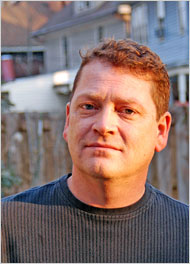 Reading Dan Chaon’s latest novel, Await Your Reply, we may not trust the identity-shifting protagonists as they flee and reconstruct new selves, but we always trust Chaon to guide us through the mysteries of who these characters will become. The book maintains its humor and humanity despite severed limbs, questionable mental health, Russian mobsters, and Psycho-like accommodations. Chaon’s work has always shown a fascination with what he used to call, in workshops at Oberlin College (where I had the good fortune of being his student), the “spooky” side of life: ghosts and unanswered questions, disappearances and visions, but also the stranger echoes of our own human chambers and relationships. While his stories often hinge on the morbid and unusual, readers don’t have to work hard to suspend disbelief; ultimately, Chaon’s work doesn’t strive to show us the freakishness of his characters’ worlds, but the familiarity of them.
Reading Dan Chaon’s latest novel, Await Your Reply, we may not trust the identity-shifting protagonists as they flee and reconstruct new selves, but we always trust Chaon to guide us through the mysteries of who these characters will become. The book maintains its humor and humanity despite severed limbs, questionable mental health, Russian mobsters, and Psycho-like accommodations. Chaon’s work has always shown a fascination with what he used to call, in workshops at Oberlin College (where I had the good fortune of being his student), the “spooky” side of life: ghosts and unanswered questions, disappearances and visions, but also the stranger echoes of our own human chambers and relationships. While his stories often hinge on the morbid and unusual, readers don’t have to work hard to suspend disbelief; ultimately, Chaon’s work doesn’t strive to show us the freakishness of his characters’ worlds, but the familiarity of them.
Await Your Reply has been named one of the best books of 2009 by the New York Times, The Washington Post, Publisher’s Weekly, Salon.com, and the American Library Association, among others. Chaon is also the author of the novel You Remind Me of Me, which was nominated for a National Book Award, and the story collections Fitting Ends and Among the Missing. He is a beloved teacher at Oberlin College, where he is the Pauline M. Delaney Professor of Creative Writing.
This interview was conducted over email in March and April of 2010.
Interview
DANIELLE LAZARIN: Await Your Reply hinges on lots of small mysteries, which slowly get solved, but which also often open up into larger mysteries. The book has a lot of resolution, and the reader feels very sated, and yet you still, in typical Chaon style, leave plenty of questions for the reader to answer on their own. You seem more comfortable than a lot of writers with the unknown; I’m thinking in particular here, of the endings of the title stories of your collections Fitting Ends and Among the Missing, both of which refuse to answer mysteries that the characters themselves cannot solve. How did you, as a writer, become comfortable with leaving questions unanswered in your stories?
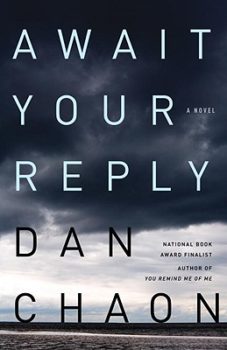 DAN CHAON:My fascination with unanswered questions started early on. As a kid, I loved ghost stories, unsolved mysteries, unexplained phenomenon. I also had a soft spot for the boy detective genre of children’s fiction—Hardy Boys, The Three Investigators, etc.—but I always felt disappointed by the resolution. One of the first pieces of fiction I wrote was a series of stories about a boy who investigated mysterious events which could never be solved. This was when I was about ten or eleven, and already I felt this weird resistance to the concept of closure.
DAN CHAON:My fascination with unanswered questions started early on. As a kid, I loved ghost stories, unsolved mysteries, unexplained phenomenon. I also had a soft spot for the boy detective genre of children’s fiction—Hardy Boys, The Three Investigators, etc.—but I always felt disappointed by the resolution. One of the first pieces of fiction I wrote was a series of stories about a boy who investigated mysterious events which could never be solved. This was when I was about ten or eleven, and already I felt this weird resistance to the concept of closure.
Later, when I was in college, I remember being drawn to the famous Freud essay “The Uncanny,” in which he talks about the concept of unheimlich. His general thesis is that the uncanny is anything we experience in adulthood that reminds us of earlier psychic stages, aspects of our unconscious life, the primitive experience of the human species, etc. Those moments when we draw close to a feeling of helpless unknowing, when we sense secrets that won’t reveal themselves, the way we do in early childhood.
For some reason, this reminded me of discussions we were having in my English class about “epiphany,” —I was taking a Joyce class at the time—and there was this essay by Robert Scholes, “Epiphanies and Epicleti” which is contained in the Viking Critical Library edition of Dubliners. Scholes calls an “epiphany” “a moment in which things or people in the world revealed their true character or their essence.” In Stephen Hero, Joyce calls the moment of epiphany “a sudden spiritual manifestation.”
In any case, it’s not an idea that Joyce can take full credit for. In Greek drama “epiphany” refers to the moment when a god appears and imposes order on the scene before him. I suppose you could say that. In any case, the idea of epiphany has a lot to do with the notion of seeing and not seeing; or as they sing in “Amazing Grace,” I once was blind, but now I see.
In more contemporary fiction, that idea of epiphany, moment of being, “imposed order,” etc. is often based on metaphorical connections between “secular” moments/objects and “spiritual” insight. A few famous examples might be the wonderfully rococo description of Jazz music at the end of Baldwin’s “Sonny’s Blues”; or, much simpler and more understated, the drawing of the cathedral in Carver’s “Cathedral” and the single paragraph, which I still find incredibly moving:
My eyes were still closed. I was in my house. I knew that. But I didn’t feel like I was inside anything.
The term epiclitus also comes from the Greek, and according to Scholes, it means, “summoned before a court,” or “accused.” Scholes says: “Thus, the epicleti may be considered the accused, summoned up by Joyce to stand trial as specimens of Irish paralysis.” In other words, Scholes says, an epiclitus is an moment in which a character fails to have a revelation, is left trapped, unable to change or escape from the mundane world. Note, that there’s almost always a sense of indictment to this kind of ending: social—spiritual—existential failure.
So almost all of Beckett’s work leads toward this end, and the absurdists, and Blanche Dubois’s “depending on the kindness of strangers,” and some of Cheever’s darker stuff, like “The Swimmer.” (Some would argue that the end of “The Country Husband” is a clueless, epiclitus ending narrated as if it’s an epiphany…)
Anyway, I’ve often thought that “epiclitus” doesn’t necessarily have to be an indictment. One of the cleanest examples of epiclitus in 20th-century short stories is Katherine Mansfield‘s wonderful, “Daughters of the Late Colonel,” and it’s also very moving and beautiful. Here’s a moment in which the two spinster sisters edge close to a moment of insight:
“It was only when she came out of the tunnel into the moonlight or by the sea or into a thunderstorm that she really felt herself. What did it mean? What was it she was always wanting? What did it all lead to? Now? Now? She turned away from the Buddha with one of her vague gestures. She went over to where Josephine was standing. She wanted to say something to Josephine, something frightfully important–about the future and what…”
But then it’s gone before she can grasp it, and the story ends with this exchange:
“I can’t say what I was going to say, because I’ve forgotten what it was…that I was going to say.”
Josephine was silent for a moment. She stared at a big cloud where the sun had been. Then she replied shortly, “I’ve forgotten too.”
Anyway, basically the two terms are flipsides of the same idea–the notion that there is some state of revelation, insight into mystery, moment of being, or what-have-you which is either grasped (epiphany) or lost (epiclitus). We (the readers) often pity or feel slightly superior to those who don’t get their epiphanies. It’s frequently presented ironically.
And yet…as for me, I guess I’ve always felt personally and emotionally closer to the searchers, rather than to the finders…to those who don’t get answers, as opposed to those who do. For me, the experience of epiclitus is closely related to the experience of the uncanny, but also to the experience of complex and problematic emotions, like yearning, and awe, and psychic unease, which are of particular interest to me. That precipice of endless uncertainty, of the impenetrable—those are the moments that I’ve always loved in literature, as well as the moments that have haunted me in life.
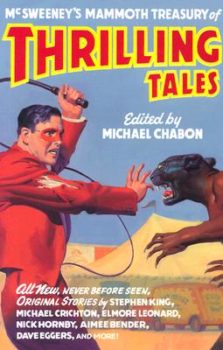 I’ve read and heard many times over that McSweeney’s Mammoth Treasury of Thrilling Tales, in which your story, “The Bees,” appeared in 2003, ushered in a new era of genre-bending in “literary” fiction. Do you think it’s at all true that books like Kelly Link’s story collections, or Lauren Groff’s Monsters of Templeton, for example, might not have fared as well say 10 or 15 years ago? Do you think the reading public’s openness and acceptance to a more fantastic kind of story within the literary really began in the past decade or so?
I’ve read and heard many times over that McSweeney’s Mammoth Treasury of Thrilling Tales, in which your story, “The Bees,” appeared in 2003, ushered in a new era of genre-bending in “literary” fiction. Do you think it’s at all true that books like Kelly Link’s story collections, or Lauren Groff’s Monsters of Templeton, for example, might not have fared as well say 10 or 15 years ago? Do you think the reading public’s openness and acceptance to a more fantastic kind of story within the literary really began in the past decade or so?
Not exactly. I think there was a certain period of American Literature—maybe about fifty years, 1950-2000, let’s say—where “realism” and “literary” were more or less synonymous, and that had to do with the rise of genre as a commercial category as much as anything. In the 19th and early 20th centuries, many of our canonized writers had no qualms about working with the fantastic—from Hawthorne and Poe to James and Wharton—and my sense is that a lot of the prejudice against fantasy, horror, etc. started with the New Critics in the 30’s and 40’s. There’s probably a long essay in that, which I won’t write.
If there has been a change, a lot of it, I think, was borne of frustration and boredom. By the mid-1990’s, the domestic mode was starting to feel like a prison to a lot of younger writers I knew. Many of us had grown up during the heyday of commercial SF and Horror in the 1970s, and that was what we read as kids. Personally, I started out as a straight-up horror writer, and it was only when my creative writing teachers told me that they didn’t accept “genre fiction” that I began to work in a more realist mode. I would say that the restrictions were good for me, and that I really needed to broaden my emotional range and explore character more fully. At the same time, I think that a lot of the creative energy and impetus in my work comes from the fantastic, the supernatural, etc. I think there’s a little glimmer of it even in my most realistic pieces—and when it’s not there, the piece doesn’t feel as alive to me. But I also don’t think I’m exactly in the New Fabulist mode, either. I’m sort of caught in-between.
But anyway, it’s hard to make sweeping statements about literary culture. Whether we’re in a new era, I don’t know.
The novel is told through three characters’ points of view: Lucy, a small town girl who’s run off with her high school history teacher, George Orson; Ryan, who’s recently reunited with his biological father; and Miles, who is searching for his less-than-stable twin brother, Hayden. Each of these stories get equal weight and time in the book; was it always this way? Did you always envision the novel as having three narratives you were setting on a collision course?
Yes. It actually started as three separate short stories, which I was working on while I was waiting for a different (unfinished, moribund) novel to figure itself out. I kept toying around with these three narratives, and I had the instinct that they were connected in some way, but I didn’t know how.
How did this work for you as you were writing? Did you work towards the mystery solved, or walk into it and hope to find an answer? The collision course you set these characters on: holy moley. We know it’s inevitable, although how the characters will collide is, as we all as writers strive for, also pretty surprising. I am hard-pressed to talk about how many delicious turns and progress the book makes without giving anything away.
The first draft of the book was really a process of figuring out what the connections were…and it was exciting to write because things kept surprising me as the three stories developed. Of course, it was also scary because there were times when I painted myself into a corner, and I didn’t know how to get out. I honestly didn’t know how the book was going to come together until the last hundred pages, though I knew from the beginning that the opening chapter and the closing chapter would happen on the same night.
I tend to think in terms of very abstract structural elements. Each chapter is a kind of building block, or episode, and I know it has to move the plot forward. But I can’t write plot until I get to know the characters, until understand why they do what they do. With this kind of novel, that was a very reckless method of writing, and I wouldn’t have been able to do it without my fantastic editor, Anika Streitfeld, who read through the book as it was being written, chapter by chapter; and my wife, Sheila, who talked me through the book’s movements and managed to get me out of a number of dead ends. The big plot reveal in the last chapter was actually her idea.
Is there a method of writing for you that doesn’t feel reckless?
I don’t know. I always feel like other writers must have things figured out better than I do…they have outlines, they know what’s going to happen to their characters, maybe they draw diagrams. It worries me a little, now that I’m starting work on a new novel, that I never actually know what I’m doing. Eventually, I’m going to stop getting lucky and it’s all going to end in tears.
I love that Miles and Hayden are twins. There’s something delectably creepy about twins (see The Shining, for starters) and so full of literary potential for doubling and contrast. Was this a conscious decision from the start: did they start off as brothers, or perhaps one character to start?
I knew that they’d be twins from the beginning, and in fact that was one of the first things I knew about the book. I’ve always been fascinated by twins. When I was a kid, growing up in rural Nebraska, I was the only kid in my grade at school, and I felt like a freak compared to the other children, so I used to imagine that it would be great to have a twin, someone who I could relate to. I was also really interested in playing on the uncanny, creepy aspects of twins—the doppelganger stuff, the stuff about split-personalities and psychic connections–a whole body of iconic, suggestive memes that have been around for a long time that seemed like it would be fun to dig into.
I took many of your classes when I was an undergrad at Oberlin. As many as I could. In fact, I believe I was told by the department chair that I could not “major in Dan Chaon.” I know I’m not alone in being a devotee of your classes. (Are you blushing yet?) Can you talk a little about your identity as a teacher—and a much-stalked one to boot—and if, and how, this differs from your identity as a writer? How do you manage to reserve energy for your own work while teaching? Do you feel like you draw on different resources as a teacher than you do as a writer?
I feel like teaching makes me a better writer. I’m lucky, because my students at Oberlin are so smart, so talented, and so mature—I don’t really feel like they’re kids so much as people who share the same passion, and we’re in a lot of ways on the same journey. We’re all asking the same questions, none of which have a single, easy answer: how do you write a good, compelling scene? What makes a character come alive for a reader? What makes a sentence beautiful? These are questions that I struggle with all the time, just the like my students do, so it’s not like I’m really on a different level. I’ve just being doing it longer.
It is hard to teach and write, of course. A big problem is that a lot of times I’m more interested in my students’ work than I am in my own. But at the same time, I feel like I’m always learning and getting ideas when I talk with students. Talking through a student’s problem can often help me articulate something that will apply to my own work, and so there’s a give-and-take that proves to be valuable for me as a writer.
Await Your Reply, deservedly so, made a good number of end-of-the-year best of lists. I know you’re a voracious reader. What books did you love in the past year?
I used to put out a list of my favorite books every year for my students, and that was fun. I read a lot of contemporary fiction. I’ve gotten away from making lists, though, in the past few years. Partially, that was because I got to know a lot more writers, and I started to feel weird about ranking them, or leaving friends off my top 20, or whatever. A few years ago, one of my year-end lists (which I thought of as a private gift to my students) made its way onto the internet, and a couple of my friends had their feelings hurt by it. So I’ve gotten wary of this kind of public declaration. I don’t generally do reviews, for the same reason. Maybe that seems cowardly, or too politic.
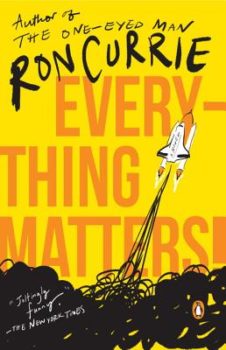 But, anyway: here are some of the books that I read and enjoyed in 2009, not in order and not inclusive of all the books I loved: Lynda Barry, What It Is; Josh Bazell, Beat the Reaper; Bonnie Jo Campbell, American Salvage; Ron Currie, Jr., Everything Matters; Amy Gerstler, Dearest Creature; Terrence Holt, In The Valley of the Kings; Victor Lavalle, Big Machine; Nami Mun, Miles From Nowhere; Sheila Schwartz, Lies Will Take You Somewhere; Jean Thompson, Do Not Deny Me; Wells Tower, Everything Ravaged, Everything Burned.
But, anyway: here are some of the books that I read and enjoyed in 2009, not in order and not inclusive of all the books I loved: Lynda Barry, What It Is; Josh Bazell, Beat the Reaper; Bonnie Jo Campbell, American Salvage; Ron Currie, Jr., Everything Matters; Amy Gerstler, Dearest Creature; Terrence Holt, In The Valley of the Kings; Victor Lavalle, Big Machine; Nami Mun, Miles From Nowhere; Sheila Schwartz, Lies Will Take You Somewhere; Jean Thompson, Do Not Deny Me; Wells Tower, Everything Ravaged, Everything Burned.
How “pure” is your process—you sent me a playlist for the novel—do you listen to music while you write? Do you read other books? Talk about the a book or story’s progress with friends or family?
My process isn’t pure at all. In fact, it’s very dirty. I feel like my books are very patched together, and collage-y, and I’m always bringing elements of other works to bear on my own work. I do listen to music almost constantly—I make playlists that are supposed to get me in the right mood for writing about particular characters, and I read constantly while writing. I also watch TV and read comics, which is frequently a big influence, especially on plot, since I love serial structure.
There are a very few people I actually show my work to while it’s in progress, but I talk about aspects of the story to a great number of people. Sometimes I make up an alternate version of the book I’m writing, because that’s somehow easier and more useful to talk about. In any case, a book exists for me in so many different versions that it’s a long, long time before I have any idea what the final form will look like.
Do you think of your characters as having certain taste in music, or is it music that you think is evocative of them to you?
Most of my characters don’t have very good taste in music. At least, they don’t share my taste in music.
Instead, the music I listen to is often a jumping off point for getting into a mood for a particular character or scene. The idea for Chapter 7, for example, came directly from a beautiful sad song by Josh Rouse called “Michigan,” which starts out “Dear Mom and Dad/I’m living in Michigan with Uncle Ray…” As I listened to the song, I began to get a sense of Ryan, driving through those woods, on his way to the cabin, and I had him writing a letter in his head to his parents which he would never send.
Another song, “My First Soul” by a band called Auld Lang Syne was absolutely essential to me when I was writing the last chapter—through it, I came to discover Hayden’s humanity, his sadness. It’s the song that I’d want to play over the closing credits of a movie of the book.
There is familiar geography in this book—your native Nebraska, and the Midwest, in particular—but also much farther reaches that we’re accustomed to in your fictions: Las Vegas, and the Artic Circle, for starters. Were these places you visited, to envision your characters inhabiting?
Some of the places are quite familiar to me—Cleveland, where I now live; and Lake McConaughy in Nebraska, where I spent childhood vacations. Other places, like Las Vegas and Ecuador, I visited; and still others, like Inuvik, NWT and Abidjan, Cote d’Ivoire, I only researched—through books and travel brochures and online, via YouTube videos. I chose places that would have the quality of stage-sets, because that was the mood that I wanted to create.
You’re a somewhat recent user of both Twitter and Facebook. Do you consider these professional or personal accounts (in 2010, is there a difference)? How has that more public presence affected your persona as a writer? Did you read, for instance, Ben Yagoda’s essay in the NYT Book Review about replying to fan e-mail, etc.?
Well, it’s different for novelists than it is for non-fiction people like Yagoda. I don’t get that many emails, and I always answer them. I don’t think I’ve done that much to cultivate a “public presence.” I do occasionally use Twitter and Facebook to notify people when I have a reading or something, but mostly I just post links to stupid things that I find funny or interesting. I don’t generally tell people what I’m eating, or where I’m at, or what I’m experiencing emotionally at any given time. I haven’t put much energy into developing a compelling persona for my Internet Self.
Await Your Reply strikes me as so contemporary without ever really making dated references; it addresses the age we’re in: of identity theft and turnover, of rapid and far-reaching communication. And yet there are great throwbacks, a sense of nostalgia running through the book as well: a dried-up lake and ghost town in Nebraska; a hypnotist named Mr. Breeze, ancient civilizations, Hayden’s past lives, etc… Can you talk about these juxtapositions and how you see these worlds overlapping?
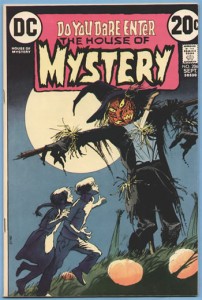 The contemporary aspect of the book wasn’t really at the forefront of my mind when I first started writing. I started out wanting to work with pastiche, to draw on iconic gothic and dark fantasy imagery—spooky, post-apocalyptic landscapes, carnivals and mysterious ruins and roadside attractions; tropes from Hitchcock and Lovecraft and Bradbury and DuMaurier and Shirley Jackson; imagery from House of Mystery comics and bad dreams. I wanted to use all the clutter that haunted and fascinated me, and put it to work.
The contemporary aspect of the book wasn’t really at the forefront of my mind when I first started writing. I started out wanting to work with pastiche, to draw on iconic gothic and dark fantasy imagery—spooky, post-apocalyptic landscapes, carnivals and mysterious ruins and roadside attractions; tropes from Hitchcock and Lovecraft and Bradbury and DuMaurier and Shirley Jackson; imagery from House of Mystery comics and bad dreams. I wanted to use all the clutter that haunted and fascinated me, and put it to work.
But at the same time, I wanted to put all this stuff in a contemporary, realistic setting, with everyday characters. I did do some research about identity theft, and hackers and trolls, and this wasn’t that hard since I spend a lot of time on the internet anyway. But most of that stuff wasn’t a big driving force. The heart of the realistic part of the book was the fact that I was raising teenage boys, and I was remembering a lot about what it felt like to be a teenager. Ryan and Lucy are sort of an amalgamation of my experience and the experiences my sons and their friends were going through; and even Miles and Hayden are sort of manchildren, stuck in adolescence, which I think is the real theme of the book.
I’ve always admired the way you don’t idealize children, or parent-child relationships; in fact, many of your youngest characters are at turns realistically creepy and flawed and not sickeningly precocious. I’m thinking of “The Bees,” or “Big Me,” and of course, Await Your Reply, where your portrait of young Hayden is neither cuddly nor average. How does raising sons change the way you write? I mean this on a practical level, as you raised your children with another writer and teacher, but also the way it changed your point of view. Did it become harder for you to write children and the parent-child relationship when you had them yourself?
I did a panel at the Associated Writing Program Conference this year about writing from a child’s point of view, and someone noted that students, at 18, 19, 20, are so close to childhood that they ought to be able to write about it vividly. But I disagreed. I think we are never further from childhood than in those years; and we are never closer to our childhood selves than when we have kids. I don’t write autobiography, but I certainly drew a lot on my experience as a parent, and my observations of my own children, which always drew forth vivid memories—memories I wouldn’t have re-encountered if I hadn’t been a parent.
Now that they’re older, do your boys read your work, and do they recognize some part of themselves or you in it?
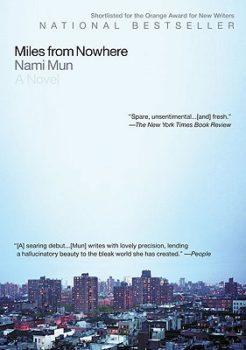 It’s funny, because my sons and I frequently read and discuss books together. Most recently, Paul and I both read Nami Mun’s Miles from Nowhere, because he’s going to be attending Columbia College in Chicago, where Mun teaches. We had a great time talking about it.
It’s funny, because my sons and I frequently read and discuss books together. Most recently, Paul and I both read Nami Mun’s Miles from Nowhere, because he’s going to be attending Columbia College in Chicago, where Mun teaches. We had a great time talking about it.
But we have never talked much about my work. I know they have read some of my stuff, and they’ve mentioned aspects that they liked. I know, for example, that both of them really enjoyed “The Bees.” But we haven’t delved very far beyond that. There would definitely be details, large and small, that they’d recognize from real life in the books—particularly Await Your Reply—but they haven’t asked about it.
What’s in the pipeline? Stories? More novels?
I have another novel that I’m working on, which I’m under contract for. After that, I think I’d like to finish a collection of stories I’ve been working on for a while. I’m also playing around with screenplays and maybe a television pilot.
Does the “dirty” process you described earlier apply to projects as well? Do you move freely between these projects or try and finish one at a time?
I usually work on several at once—often, it takes me a while to figure out whether they are separate projects or part of the same thing, and in fact I’m still in the midst of that right now, trying to decide whether these fragments I’ve been messing with are really part of the same thing or whether I’m actually writing six or seven different books.
I was struck by the irony of the fluidity of the world that these characters live in. On the one hand, most of them make a conscious choice to leave behind the person they were at one point, changing their names or locations or occupations for a chance at a better life. But often in this disappearing act they discover that who they are is maybe too easy to shed, and not all of them find the freedom they’re looking for. In fact, many of them end up with a fate worse than the one they thought they were avoiding (see Ryan, on page 1, next to his severed hand). Here’s Lucy, on changing her identity:
The truth was, she had killed herself months ago. Now she was next to nothing: A nameless physical form that could be exchanged and exchanged and exchanged and exchanged until nothing remained but molecules. The stuff of stars—that’s what George Orson once said when he was holding forth to their history class. Hydrogen and carbon and all the primordial particles that existed from the very beginning of time, that’s what you’re made up of, he told them. As if that were a comfort.
Each of your characters has, in varying degrees, this “dear-God-what-have-I-done” moment. I wonder if you could talk a little about the difficulties of these shifts for them, of this kind of struggle between their internal and external identities, between the public and private personas we all move between. Without, of course, giving too much away.
As I mentioned before, I think this book is very much about adolescence—that time when all our adult choices are before us and we could be anyone, as Ryan says in his final chapter. This is stuff that really interests me, and I’ve written about it before. In some ways, the novel is a kind of extension or rewrite of my story “Big Me” and there’s a passage in that story that I mulled over:
There are so many people we could become, and we leave such a trail of bodies through our teens and twenties that it’s hard to tell which one is us. How many versions do we abandon over the years? How many end up nearly forgotten, mumbling and gasping for air in some tenement room of our consciousness…
That was one thing I was thinking about. Then I was also looking at it from the other end. As I was writing the book, my wife was very sick, and I knew that our time together was not going to be very long. I was intensely aware of the way that possibilities and futures that we imagine for ourselves would be taken away, and so I was also aware of those moments when we realize that our choices are not infinite.
When I lost Sheila, my life was shattered. Ironically, I now find myself once again in a situation in which I have to try to imagine myself into a new life, I have to try to remake myself without her, to fill up the blank slate of the future with something. I feel like I have been brought back full circle to the place I was when I was eighteen or nineteen, and I don’t like it one bit.
American culture tends to focus on the beauty and freedom of transformation, we worship the metaphor of the journey, but at the same time, like Dorothy in The Wizard of Oz, we long for home.
In the novel, Hayden and Miles’ mother says “Oh Hayden,” she would say, with exasperation. “Why can’t you make up stories about happy people? Why does everything have to be so morbid?” This struck me as a nod to your own work, in which folks are not the particularly happy-go-lucky type, but also to the common complaint about “literary” fiction in general, that it’s too morbid, too depressing. Care to confirm, deny, or defend?
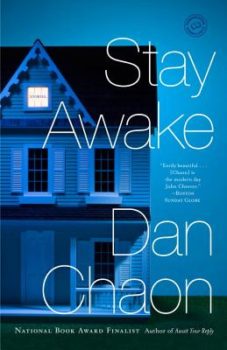 I don’t know how to answer, really. I know that I’ll never be accused of being too uplifting, and the passage you quote is definitely a nod to comments I’ve heard about my own work, and complaints that I’ve heard about literary fiction in general. Maybe I don’t understand what it means when people talk about a happy ending. Maybe I don’t understand what people want. I like the idea that literature draws us closer to other lives, and that the experience of knowing what it feels like from the point of view of someone else, and that it expands our ability to sympathize.
I don’t know how to answer, really. I know that I’ll never be accused of being too uplifting, and the passage you quote is definitely a nod to comments I’ve heard about my own work, and complaints that I’ve heard about literary fiction in general. Maybe I don’t understand what it means when people talk about a happy ending. Maybe I don’t understand what people want. I like the idea that literature draws us closer to other lives, and that the experience of knowing what it feels like from the point of view of someone else, and that it expands our ability to sympathize.
The question, then, is whether a work leads us to hope or towards despair. If a story moves abnormally toward “happy” resolution, isn’t that creating a false expectation, which will eventually disappoint? If a story moves toward the worst-case-scenario, doesn’t that also over-exaggerate? I think that many people read doubt as sad and certainty as happy, but I’m not so sure.
Further Reading and Links
- You can download excerpts from each of Dan Chaon’s novels and collections on his website.
- Via last.fm, listen to the soundtrack for Await Your Reply.
- Online interviews with Chaon abound: here are two of our favorites: in The Believer; on NPR (it describes meat as a reward for writing!).
- If you’re shopping for copies of Dan Chaon’s books, support indie bookstores by buying from Powell’s: Await Your Reply, Among the Missing, You Remind Me of Me, Fitting Ends.





